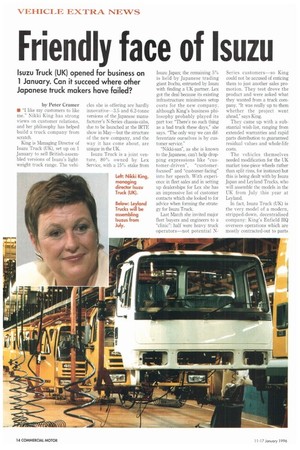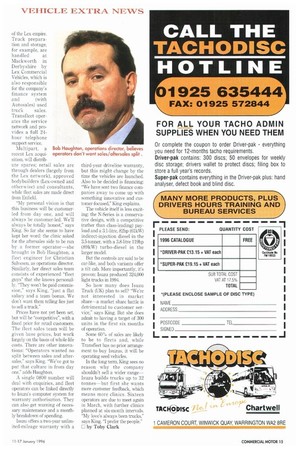Friendly face of Isuzu
Page 16

Page 17

If you've noticed an error in this article please click here to report it so we can fix it.
Isuzu Truck (UK) opened for business on 1 January. Can it succeed where other Japanese truck makers have failed?
by Peter Cramer • "I like my customers to like me." Nikki King has strong views on customer relations, and her philosophy has helped build a truck company from scratch.
King is Managing Director of Isuzu Truck (UK), set up on 1 January to sell British-assembled versions of Isuzu's lightweight truck range. The vehi
des she is offering are hardly innovative-3.5 and 6.2-tonne versions of the Japanese manufacturer's N-Series chassis-cabs, due to be launched at the IRTE show in May—but the structure of the new company, and the way it has come about, are unique in the UK.
Isuzu Truck is a joint venture, 80% owned by Lex Service, with a 15% stake from Isuzu Japan; the remaining 5% is held by Japanese trading giant Itochu, entrusted by Isuzu with finding a UK partner. Lex got the deal because its existing infrastructure minimises setup costs for the new company, although King's business philosophy probably played its part too: "There's no such thing as a bad truck these days," she says. "The only way we can differentiate ourselves is by customer service."
"Nikki-san", as she is known to the Japanese, can't help dropping expressions like "customer-driven", "customerfocused" and "customer-facing" into her speech. With experience in fleet sales and in setting up dealerships for Lex she has an impressive list of customer contacts which she looked to for advice when forming the strategy for Isuzu Truck.
Last March she invited major fleet buyers and engineers to a "clinic": half were heavy truck operators—not potential N Series customers—so King could not be accused of enticing them to just another sales promotion. They test drove the product and were asked what they wanted from a truck company. "It was really up to them whether the project went ahead," says King.
They came up with a substantial wish-list, ranging from extended warranties and rapid parts distribution to guaranteed residual values and whole-life costs.
The vehicles themselves needed modification for the UK market (one-piece wheels rather than split rims, for instance) but this is being dealt with by Isuzu Japan and Leyland Trucks, who will assemble the models in the UK from July this year at Leyland.
In fact, Isuzu Truck (UK) is the very model of a modern, stripped-down, decentralised company: King's Enfield HQ oversees operations which are mostly contracted-out to parts of the Lex empire. Truck preparation and storage, for example, are handled at Mackworth in Derbyshire by Lex Commercial Vehicles, which is also responsible for the company's finance system and (with Autosales) used truck sales. Transfieet operates the service network and provides a full 24hour telephone support service, Multipart, a recent Lex acquisition, will distribute spares; retail sales are through dealers (largely from the Lex network), approved bodybuilders (Lex-owned and otherwise) and consultants, while fleet sales are made direct from Enfield.
"My personal vision is that this business will be customerled from day one, and will always be customer-led. We'll always be totally honest." says King. So far she seems to have kept her word: the clinic asked for the aftersales side to be run by a former operator—she brought in Bob Haughton, a fleet engineer for Christian Salvesen. as operations director. Similarly, her direct sales team consists of experienced "fleet guys" that she knows personally. "They won't be paid commission," says King, "just a flat salary and a team bonus. We don't want them telling lies just to sell a truck."
Prices have not yet been set, but will be "competitive", with a fixed price for retail customers. The fleet sales team will be given base prices, but work largely on the basis of whole-life costs. There are other innovations: "Operators wanted no split between sales and aftersales," says King. "We've got to put that culture in from day one," adds Haughton.
A single 0800 number will deal with enquiries, and fleet operators can be linked directly to Isuzlis computer system for warranty authorisation. They can also get warning of necessary maintenance and a monthly breakdown of spending.
1st= offers a two-year unlimited-mileage warranty with a third-year driveline warranty, but this might change by the time the vehicles are launched. Also to be decided is financing: "We have sent two finance companies away to come up with something innovative and customer-focused," King explains.
The vehicle itself is less exciting: the N-Series is a conservative design, with a competitive (rather than class-leading) payload and a 3.1-litre, 82hp (61kW) indirect-injection diesel in the 3.5-tonner, with a 3.8-litre 119hp (89kW) turbo-diesel in the larger model.
But the controls are said to be car-like, and both variants offer a tilt cab. More importantly, it's proven: Isuzu produced 324,000 light trucks in 1994.
So how many does Isuzu Truck (UK) plan to sell? "We're not interested in market share-a market share battle is detrimental to customer service," says King. But she does admit to having a target of 300 units in the first six months of operation.
Some 60% of sales are likely to be to fleets and, while Transfleet has no prior arrangement to buy Isuzus, it will be operating seed vehicles.
In the long term. King sees no reason why the company shouldn't sell a wider rangeIsuzu builds trucks up to 32 tonnes—but first she wants more customer feedback, which means more clinics. Sixteen operators are due to meet again in March, with further clinics planned at six-month intervals. "My love's always been trucks," says King. "I prefer the people." D by Toby Clark












































































































